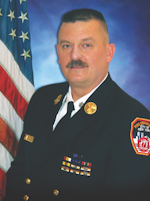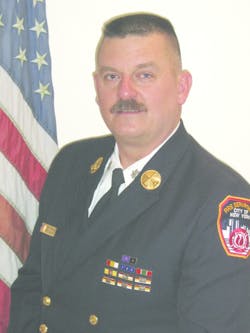It’s been going on for more than a few years and sometimes it seems like the current not-so-rosy national financial conditions are here to stay. Although that is certainly not true, we are all suffering some type of service or staffing cuts or other belt-tightening. Even volunteer companies are experiencing cuts in funding and the list of people and departments affected goes on and on. So what do I mean when I say, “Times are tough, and so are we”?
Here’s the connection. If you think about the cutbacks and closings you read about or hear about, the list is frightening:
• Browning out or nightly closing of fire stations
• Permanent closing of fire companies
• Reductions in staffing on companies
• Apparatus purchases canceled
• Shortages of tools and equipment
• Firehouse maintenance halted
• Training curtailed
Living with cutbacks
The purpose of this column is to talk about what “we” should be doing while these not-so-popular or productive events are unfolding. When I say, “Times are tough, and so are we,” I’m talking about all of us! Each one of us is in a unique and not-very-comfortable position. We are members of the greatest group of public servants in America and our organizations are under assault.
I am in no way saying we should lie down and take whatever is dished out. There are many ways in which we can all participate in an organized and lawful way to stop or minimize the negative effects on our departments. But what about the day-to-day activities that we are all involved with in our fire companies? What should career firefighters and officers be doing while working shifts with less staffing than before? What should volunteer firefighters and officers be doing when responding to alarms with outdated apparatus instead of the new one that was canceled because of budget cuts? None of the negative events and situations that a fire department is experiencing should cause a negative or divisive atmosphere in the firehouse or a negative effect on the services the department provides to the public.
This is easier to say than it is to do. What I’m really saying is that we need to put our best foot forward and keep up the highest level of service we can. I know if the city closes a fire company in your battalion, it may take longer for a full assignment of three engines and two ladders to arrive at that location. That longer response time is a result of the department’s decision to close a company. What should not happen is the remaining companies suddenly respond more “cautiously” and cause an even more severe delay in fire company arrival.
When a fire company is forced to keep an older and less-reliable apparatus because the department has cut the funds for replacements, there could be times and situations when a mechanical or technical problem may cause a delay in response or even a company to be out of service. What should not happen is the company “looks” for reasons to put the apparatus out of service or delay a response simply because the members would rather have the new apparatus they were promised.
What I’m talking about here is a single concept or idea that can have a dramatic positive effect on a fire company or department, even if it is facing tough times. The idea is to continue that positive attitude that all firefighters are born with. Positive attitudes are not just for the good times. In fact, just about everyone has a positive attitude when times are good. It’s easy! The challenge is to have and maintain a positive attitude when times are tough.
Anybody can do this job with new tools, plenty of companies and every seat on the apparatus occupied by a firefighter. Maybe you had four people on your engine, but now you have three. I also know that both you and I could list the negative impacts of riding with three, both on us and on the public. The challenge is to make riding with three work. No, I don’t want to ride with three, but we are!
Rather than coming back from every fire and listing the tasks that didn’t get completed because of the missing firefighter, take note of and discuss how well the company managed with the three. Maintain a positive, professional attitude. Work to right the wrongs and get the best equipment, staffing and apparatus you can, but at the same time work hard and be tough and get the job done for yourself and the people in your community who are counting on you.
Chief Salka takes a candid look at news and events impacting the fire service in his blog “The Fire Scene” at http://www.firehouse.com/blogs/the-fire-scene.
JOHN J. SALKA Jr., a Firehouse® contributing editor, recently retired as a battalion chief with FDNY, serving as commander of the 18th battalion in the Bronx. Salka has instructed at several FDNY training programs, including the department’s Probationary Firefighters School, Captains Management Program and Battalion Chiefs Command Course. He conducts training programs at national and local conferences and has been recognized for his firefighter survival course “Get Out Alive.” Salka co-authored the FDNY Engine Company Operations manual and wrote the book First In, Last Out – Leadership Lessons From the New York Fire Department. He also operates Fire Command Training (www.firecommandtraining.com), a New York-based fire service training and consulting firm.

John J. Salka Jr. | Battalion Chief
JOHN J. SALKA JR., who is a Firehouse contributing editor, retired as a battalion chief with FDNY, serving as commander of the 18th battalion in the Bronx. Salka has instructed at several FDNY training programs, including the department’s Probationary Firefighters School, Captains Management Program and Battalion Chiefs Command Course. He conducts training programs at national and local conferences and has been recognized for his firefighter survival course, “Get Out Alive.” Salka co-authored the FDNY Engine Company Operations manual and wrote the book "First In, Last Out–Leadership Lessons From the New York Fire Department." He also operates Fire Command Training, which is a New York-based fire service training and consulting firm.




![Dunstable 4-Alarm Fire Audio 12/16/2024 [Massachusetts] Dunstable 4-Alarm Fire Audio 12/16/2024 [Massachusetts]](https://img.firehouse.com/files/base/cygnus/fhc/image/2024/12/6762da9b72a82976e5752e1d-maxresdefault.png?auto=format,compress&fit=&q=45&h=139&height=139&w=250&width=250)

